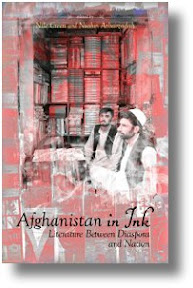Afghanistan in Ink
Green, Nile [u.a.] [Hrsg.]:
Afghanistan in Ink : Literature Between Diaspora and Nation / ed. by Nile Green and Nushin Arbabzadah. - New York : Columbia University Press, 2013. - XVIII, 303 S.
ISBN 978-0-231-70342-0
US$ 35,00
Europäische Ausg.: Idem. - London : Hurst, 2013. - ISBN 978-1-84904-204-8. - £ 24,99
DDC: 891.59309; 891.5609
-- Die britische Ausg. ist Februar 2013 erschienen, die US-Ausgabe ist angekündigt für März 2013 (Columbia Univ. Press) --
Beschreibung
Afghanistan in Ink uses a vast and largely unknown corpus of twentieth-century Afghan Dari and Pashto literature to show how Afghans have conceived of their modern history and how writers’ patronage or exile has dominated the contours of that history. Drawing on an abundance of Afghan-language sources, chapters by international experts reveal a disruptive twentieth-century dynamic, in which literary globalization has caused the destabilization of the state by importing multiple, conflicting ideologies.
Afghanistan in Ink situates the twentieth century’s itinerant and exiled Afghan writers within their transnational contexts and maps Afghan artistic and ideological interactions with Muslim and Western nations. The volume emphasizes the social and political dimensions of this literature and, through its extensive introduction, provides both specialists and nonspecialists with unique, “inside” perspectives on the religious, political, and cultural debates shaping modern Afghan society. [Verlagsinformation]
Herausgeber

Nile Green is professor of South Asian and Islamic history at the University of California, Los Angeles, and chair of the university’s Program on Central Asia. Profile page.

Nushin Arbabzadah is a research scholar at the UCLA Center for the Study of Women. She regularly writes for The Guardian online on contemporary Afghanistan. Profile page (UCLA). Profile page (The Guardian).
Quellen: Columbia University Press; Hurst & Co.; WorldCat; WorldCat; Amazon; Library of Congress
Bildquelle: Columbia University Press
Bibliographie: [1]
References
- (2013). Afghanistan in Ink: Literature Between Diaspora and Nation. XVIII, 303 S.

